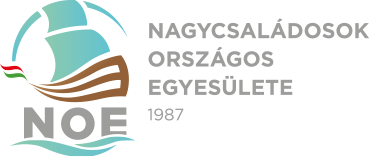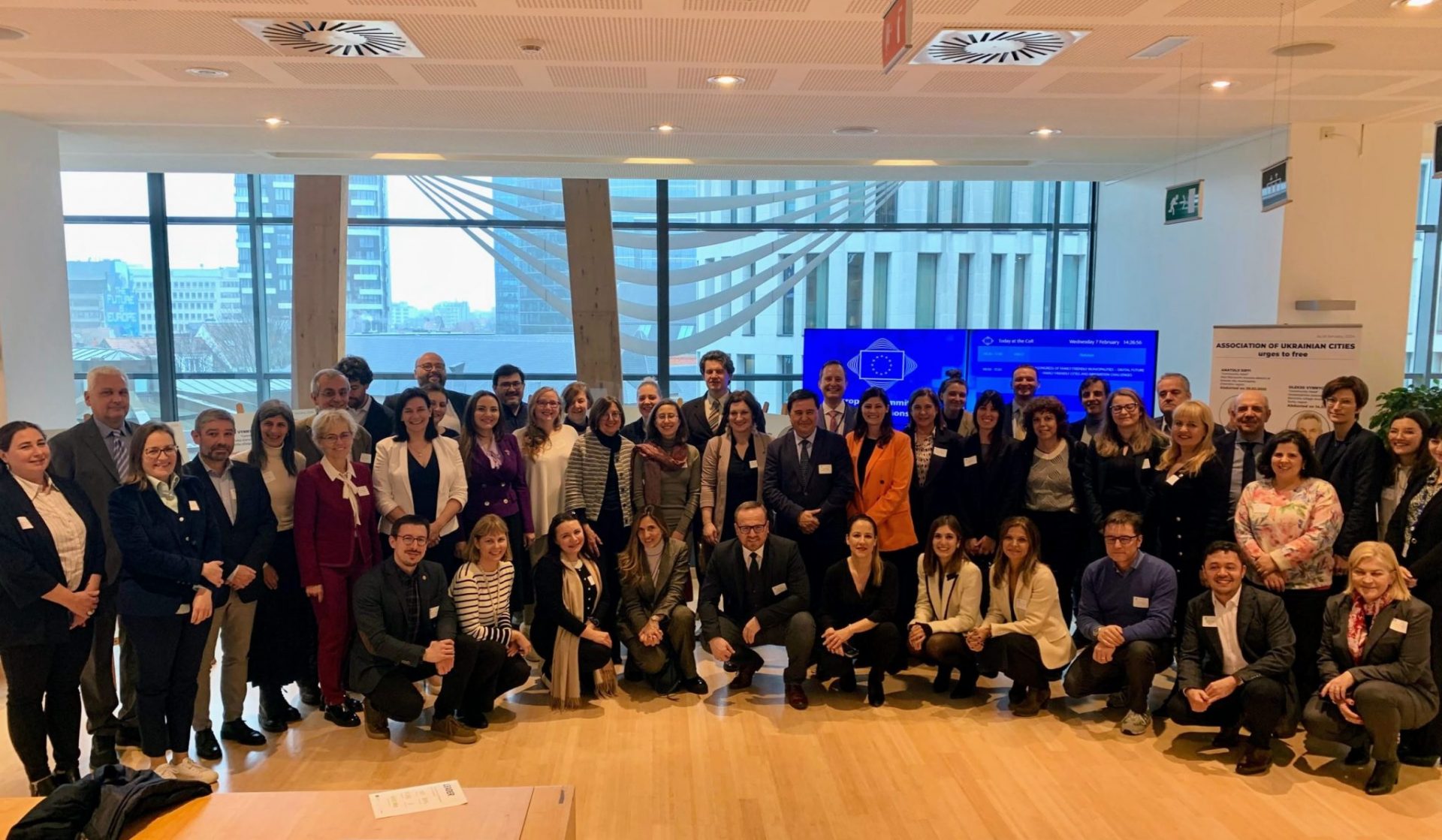The Congress was held at the European Committee of the Regions in the European capital on 7 February under the title “Digital Future: Family-friendly cities and the challenges of innovation”.
Academics, representatives of European institutions, politicians, technicians and administrators from municipalities, invited by ELFAC, the European Large Families Confederation, attended the congress to discuss how digital innovation can make life easier for families, territories more welcoming and attractive, and businesses more competitive. Keeping in mind the perspective of family well-being, speakers emphasised the need to counter the demographic crisis in Europe with actions in favour of quality of life: access to services and training even in rural areas and creating conditions for smart and flexible work.
The opening
The congress, moderated by ELFAC Secretary General Raul Sanchez, opened with greetings from Regina Maroncelli, the president of the confederation. She thanked the participants for having undertaken a long and arduous journey to affirm the value of the family, at the heart of meaningful local policies, irreplaceable social capital for cities and businesses.
“Today we wanted to inform the cities of the Network of the possibilities that exist at European level to implement policies that benefit families”, explained Regina Maroncelli, “but we also wanted the large European networks and institutions to know about the Network, this ‘family revolution’, as ELFAC Secretary Sánchez called it, and the concrete possibility of making workplaces and living spaces more habitable and attentive to the needs of people and their families”. This is what ELFAC secretary Sánchez called it, and the concrete possibility of making workplaces and living spaces more habitable and attentive to the needs of people and their families”.
Krzysztof Balon, Vice-President Civil Society Organisations’ Group of the European Economic and Social Committee (EESC), then spoke on the theme of the Environmental, social and governance (ESG) in Europe, and the importance of families for the European future.
His speech was followed by a video greeting message from Francesca Gerosa, new Councillor for the Family of the Province of Trentino, who retraced the stages of growth and evolution of the Network, now also open to businesses, which are called to become partners and allies of the municipalities in order to make the territory attractive and competitive.

The Deputy Commissioner for Democracy and Demography of the European Commission, Dubravka Suica, although busy in Strasbourg, did not want to miss the Congress, sending her greetings and renewing her commitment to work together to address what is now a priority for the European Community: the challenge of demographic change. At risk, Suica stressed, are democracy and the cohesion of the Union with areas that seem destined to be depopulated in favour of others whose growth cannot and must not be at the expense of the marginalised areas of the continent.
Speakers from different perspectives
To give an overview of the situation in Europe, economist Matteo Rizzolli, professor at the Lumsa University in Rome and father of six children, spoke. He stressed how, alongside family support policies, new paradigms must be introduced that place the family and parenthood at the centre of policy, with “family integration” offering a new perspective on work and a new consideration of parenthood, so that it is seen as a “public good” to be supported and protected. For this reason, said Rizzolli, extending the right to vote to minors through a system of proxies would balance investment and attention in favour of children and young people, today increasingly in the minority and without a vote. While Professor Rizzolli “provoked” municipalities to introduce voting experimentation, Rome Tre University professor Lucia Marchegiani – “the mother of Professor Rizzoli’s own children”, as she jokingly recalled – spoke of digitalisation as the factor that can change the life of a company for better or worse. Marchegiani said it is about making work more human, starting from the centrality of the worker – the most important capital of today’s, but above all tomorrow’s companies – and his or her well-being. This means also taking into account the private and family sphere, offering tailor-made benefits and services, and establishing an alliance, a digital pact in workplaces and cities for the training and protection of human capital.
The morning continued with speeches by Aaron Imperiale, from the European Association for Innovation in Local Development (AIDEL), who presented a project carried out in cooperation with the FAO for the digitalisation of rural areas; Adam Karacsony, member of the Committee of the Regions, who stressed the importance of family policies as a European priority; Margit Tuenneman, delegate of the secretariat of URBACT, a cooperation programme involving more than 1000 European municipalities, which the organisation helps to join together in small networks to implement joint innovation projects.
In the afternoon, after an interesting presentation by Agnieszka Bednarska-Bernatek, from the European Commission’s Territorial Development Office, on the prospects for the regions most affected by demographic problems with the Talent Development Mechanism, Luciano Malfer, who presented the “family” model of the Autonomous Province of Trento and the innovative “phone box” project; Fokion Zaimis, deputy governor of the region of Achaia (Western Greece), presented the integrated policies developed in this region for families. Mecedes Hernández, from the MasFamilia Foundation, presented the process for the certification for family responsible companies and municipalities developed in Spain.
Good practices
After the speakers, representatives of mayors and councillors presented good practices in the field of digitalisation to improve the lives of families and young people. Innovative family policies and digital services for families were presented by Mateusz Ploskonka, Deputy Director of the Department of Health and Social Policy of the city of Krakow (Poland), Péter Szabó, mayor of Paks (Hungary); Emese Balogh-Madár, vice mayor of Belvaros-Lipotvaros (District V Budapest); from Portugal Assunção Mariana Carlos Ramos, councilwoman of Ílhavo, Catarina Mendes, Councilwoman of Albergaria-a-Velha; Mariana Gomes, head of department and Jose Pedro Machado, councilor, both from Santo Tirso, and a video presentation from the city of Agueda.
Maria Victoria Jiménez and José Fernando García, president and secretary of the Large Families Association of Ciudad Real (Spain), talked on actions in rural municipalities; and from Italy Alessandra de Grandis, municipal adviser for family policies in Druento, and Andrea Bonelli, Member of Digital and Innovation Committee from “Consiglio Nazionale Centri Commerciali”, presented an innivative experience of cooperation between private and public sector. Finally, Chiara Ledda, from Italian Large Families Association, presented innovative measures in communication for families in the city of Alghero (Sardinia).
The company Xera Group from Città Sant’Angelo (Pe, Italy), a partner of the Network and already engaged in collaboration with the local area through social projects, was not present due to an unforeseen commitment, but sent a short presentation, by Martina Colleluori, Business Developer.
 Agreement and diplomas for new members
Agreement and diplomas for new members
Regina Maroncelli presented the diplomas of adhesion to the Network to the municipalities of Castellón de la Plana (Spain, represented by its councillor for families Alberto Vidal), Paks (Hungary) and Druento (Italy).
The intense day ended with the signing of the agreement between ELFAC and MasFamilia Foundation for a collaboration aimed at strengthening the dissemination of family certification among companies and municipalities.
 “We are very happy with this agreement,’ says Regina Maroncelli, President of Elfac, ‘we have succeeded in involving a strong and motivated ally in our project, with long experience in family welfare and reconciliation certification and a network that is already extensive in the Iberian Peninsula. Spain can give a strong impetus to the family revolution process with which Elfac intends to contaminate municipalities and companies. Together we can be even more incisive’.
“We are very happy with this agreement,’ says Regina Maroncelli, President of Elfac, ‘we have succeeded in involving a strong and motivated ally in our project, with long experience in family welfare and reconciliation certification and a network that is already extensive in the Iberian Peninsula. Spain can give a strong impetus to the family revolution process with which Elfac intends to contaminate municipalities and companies. Together we can be even more incisive’.
